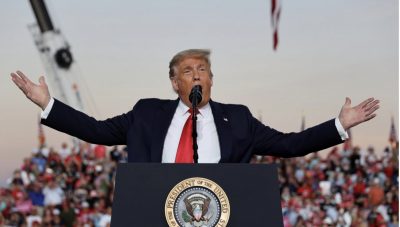Trump Support Remains Unmoved by Investigations, Poll Finds

The American public’s views of former President Donald Trump have remained remarkably stable across a number of different measures in recent months, even as he faces multiple investigations and as he remains a central figure in the midterm elections, according to the most recent New York Times/Siena College poll.
Voters held nearly identical views from those earlier in the summer, on whether they had a favorable view of Trump, whether they thought he had committed serious federal crimes, and whom they would support in a hypothetical 2024 Trump-Biden matchup,
Overall, 44% of voters viewed Trump favorably, and 53% viewed him unfavorably. The recent poll was fielded early this month, after news of the Justice Department’s inquiry into Trump’s handling of confidential documents but before the New York attorney general announced she was suing Trump and his family business.
That level of Trump support has effectively been unchanged since the last Times/Siena poll, which was fielded in July amid televised hearings by the House committee investigating the Jan. 6 storming of the Capitol. It was also fundamentally similar to levels of support Times/Siena polls and other surveys found in recent years.
The public’s view of Trump’s fight against the election results also remained largely unchanged, with 54% in the most recent survey saying his actions posed a threat to democracy and 38% saying he had just exercised his right to contest the election.
And roughly half of voters said they thought Trump had committed serious federal crimes, while 38% thought he had not. That was similar to the responses from July, when respondents were asked more specifically about Trump’s actions in the aftermath of the 2020 election.
Trump has often boasted about the loyalty of his supporters. That loyalty has long been clear in his favorability ratings, which remained stable throughout his time in office, even during moments of peak turmoil, such as his first impeachment trial. His approval ratings rose briefly as COVID-19 started to spread in the United States in spring of 2020, but by May his support had returned to previous levels.
Many of Trump’s signature policy proposals have remained fairly popular among the public, the September poll found. Half of all respondents favored a wall along the U.S.-Mexico border, including more than 15% of those who said they would vote for Biden in 2024. And a majority said they agreed more with the Republican Party than with the Democratic Party when it came to illegal immigration.
Trump has signaled another run for president. In a hypothetical rematch in 2024 with President Joe Biden, 45% said they would support Biden, while 42% said they would support Trump. (Biden’s margin of victory in the 2020 election was 4.4 percentage points.)
In 2020, Trump made gains among Hispanic voters, a group that has historically favored Democrats. The recent poll found that Republicans continue to maintain a similar level of support among Hispanic voters, particularly young Hispanic men.
Antonio Chavez, a 34-year-old delivery driver from Amarillo, Texas, said that he had voted for a mix of Democrats and Republicans over the years but that he would probably vote for Trump in 2024 if he ran again.
“I don’t know too much,” he said. “When the race starts getting closer, I’ll start paying attention, but right now he’s just at the forefront for me.
“I have a few reservations about supporting him because of the document issue, but I like to see what the other side is going with.”
There were signs in the poll that views on Trump were more complex than they are sometimes made out to be. Across all measures asked, 30% of voters consistently held views that could be considered pro-Trump, such as planning to support him if he runs in 2024 and saying that his actions after the 2020 election were justified. Thirty-nine percent of voters consistently held a series of views that could be described as anti-Trump.
However, nearly 30% appeared to hold seemingly conflicting views about him and his actions — either by expressing a mix of sentiments or by declining to respond to one of the questions.
For instance, 14% of respondents said that they both planned to support him and believed his actions after the 2020 election went so far as to be a threat to democracy.
(The New York Times)

